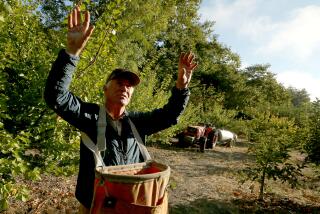Shorter fruit trees bred to cut farm labor costs
- Share via
When it comes to growing peaches and nectarines, farmers are often encumbered by one of the most important tools of the trade: ladders.
Setting-up and moving them to prune or harvest trees can consume half a worker’s day. Moreover, the contraptions are dangerous – one of the reasons why peach and nectarine growers pay 40% more for workers’ compensation insurance than grape growers.
Now researchers at UC Davis are breeding a solution – miniaturized stone fruit trees that produce the same yield as traditional trees but take the ladder out of the equation.
“We’re designing ‘ladderless’ orchards, which have the potential to cut labor costs by 50% or more and improve worker safety,” said Ted DeJong, a UC Cooperative Extension specialist and plant physiology professor at UC Davis.
DeJong is joined by Kevin Day, a Cooperative Extension farm advisor in Tulare County, in leading the project, which involves breeding new rootstock that produces trees 7 to 8 feet tall rather than the traditional 13 feet.
Farmers said they would welcome the new trees, which would allow workers to prune and harvest from the ground.
“Ladderless orchards would be huge for our industry,” Bill Chandler, a peach and nectarine grower in Selma, Calif., told UC Davis’ news service. “There are so many costs associated with ladders that many growers are switching over to almonds just to stay in business.”
The researchers will begin planting the new trees next spring, the university said.
Follow @dhpierson for more food and agriculture news.
More to Read
Inside the business of entertainment
The Wide Shot brings you news, analysis and insights on everything from streaming wars to production — and what it all means for the future.
You may occasionally receive promotional content from the Los Angeles Times.











